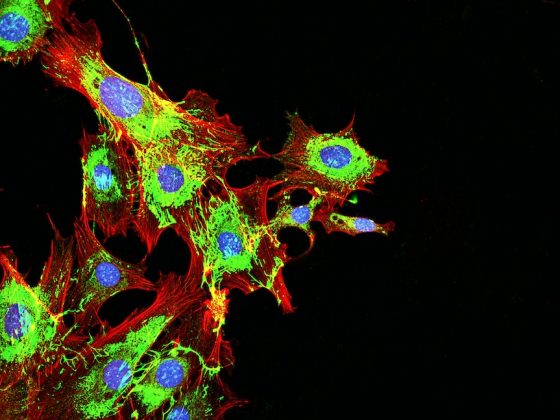Accelerated ageing is more common in recent birth cohorts and associated with increased incidence of early-onset solid tumours. The study, abstract 846, presented at the American Association for Cancer Research (AACR) Annual Meeting, held April 5–10, in San Diego, found that each standard deviation increase in accelerated ageing – defined according to a set of prospectively gathered biomarkers – was associated with a 42% increased risk of early-onset lung cancer, 22% increased risk of early-onset gastrointestinal cancer, and a 36% increased risk of early-onset uterine cancers.
“By examining the relationship between accelerating ageing and the risk of early-onset cancers, we provide a fresh perspective on the shared aetiology of early-onset cancers,” said first author Ruiyi Tian, from Washington University School of Medicine in St. Louis, Missouri. “If validated, our findings suggest that interventions to slow biological ageing could be a new avenue for cancer prevention and screening efforts tailored to younger individuals with signs of accelerated ageing.”
Unlike chronological age, biological age may be influenced by factors such as diet, physical activity, mental health, and environmental stress. “Accumulating evidence suggests that the younger generation may be ageing more swiftly than anticipated, likely due to earlier exposure to various risk factors and environmental insults. However, the impact of accelerated ageing on early-onset cancer development remains unclear,” said Tian.
A global study, published in BMJ Oncology in 2023, found that between 1990 and 2019 the number of early-onset cancers increased by 79.1%. One disease area that has recently received particular attention is the rising rate of colorectal cancer in young people. In 2019 the American Cancer Society reported that one-fifth of colorectal cancer diagnoses were in people under 55 years, around double the rate reported in 1995.
For the current study, senior author Yin Cao and colleagues posed two questions. They asked: Are younger generations ageing faster? And is ageing faster associated with increased risk of early-onset cancer? The team examined data held in the UK Biobank – a long-term prospective study exploring contributions of genetics and environmental exposures to development of disease – that had been gathered from 148,724 participants who were aged 37 to 54 years at the time of the current study. Biological age was based on nine blood chemistry markers collected at baseline; albumin, alkaline phosphatase, creatinine, C-reactive protein, glucose, mean corpuscular volume, red cell distribution width, white blood cell count, and lymphocyte proportion. The biomarkers were entered into the PhenoAge algorithm, which calculates biological age, providing a quantifiable measure of each subject’s rate of ageing. Individuals whose biological age was found to be higher than their chronological age were defined as having ‘accelerated ageing’.
Exploration of cancer registries showed that, across 1,707,115 person-years, 3,190 people from the UK Biobank database were diagnosed with early cancers before the age of 55 years.
The investigators found that, compared to individuals born in 1950–1954, those born in 1955–1959 have a 6% higher likelihood of accelerated ageing, those born in 1960–1964 have an 11% higher likelihood, and those born in 1965–1974 had a 17% higher likelihood.
Following multivariable adjustment, accelerated ageing was associated with an increased risk of early-onset cancer (hazard ratio [HR] per standard deviation [SD] increase=1.08, 95%CI 1.04–1.12, P trend <0.001). Each 1-SD increase in accelerated ageing was associated with a 42% increased risk of early-onset lung cancer (HR=1.42, 95%CI 1.19–1.70); a 22% increased risk of early-onset gastrointestinal cancer (HR=1.22, 95%CI 1.11–1.34); and a 36% increased risk of early-onset uterine cancer (HR=1.36, 95%CI 1.13–1.64).
No associations were found for accelerated ageing in central nervous system, head and neck, thyroid, breast, melanoma, ovarian, or prostate cancers.
While accelerated ageing had little impact on the risk of late-onset lung cancer (HR per SD=1.09, 95%CI 0.96–1.23), it was associated with a 16% increased risk of late-onset gastrointestinal cancer (HR=1.16, 95%CI 1.08–1.24), and a 23% increased risk of late-onset uterine cancer (HR=1.23, 95%CI 1.06–1.43).
In comparison to those in the lowest tertile for accelerated ageing (bottom 33.3% of values), people in the highest tertile had double (202%) the risk for early-onset lung cancer (HR=2.02, 95%CI 1.13–3.62); 62% higher risk of early-onset gastrointestinal tumours (HR=1.62, 95%CI 1.27–2.08); and 83% higher risk of early-onset uterine cancers (HR=1.83, 95%CI 1.10–3.04).
“Accelerated ageing may emerge as a risk factor for early-onset solid cancers, especially lung, gastrointestinal and uterine cancers,” Tian told the AACR press briefing. “These findings require validation in diverse populations. Mechanistic studies are needed to understand the association between accelerated ageing and early-onset cancers. Future studies should also help guide the development of novel preventive and therapeutic modalities.”
In an interview with CNN News, Anne Blaes, who studies the impact of biological ageing in cancer survivors at the University of Minnesota, commented that the research indicated better ways to identify people at high risk of getting early cancers. “We’re seeing more and more cancers, especially GI [gastrointestinal] and breast cancers in younger individuals. And if we had a way of identifying who’s at higher risk for those, then really, you can imagine we’d be recommending screening at a different time,” said Blaes, who was not involved in the current research. People found to be at high risk of accelerated ageing, she suggested, could be targeted with lifestyle interventions (in areas such as nutrition, exercise, and sleep) or medications to slow accelerated ageing (such as senolytics, a class of drugs inducing death of senescent cells).












